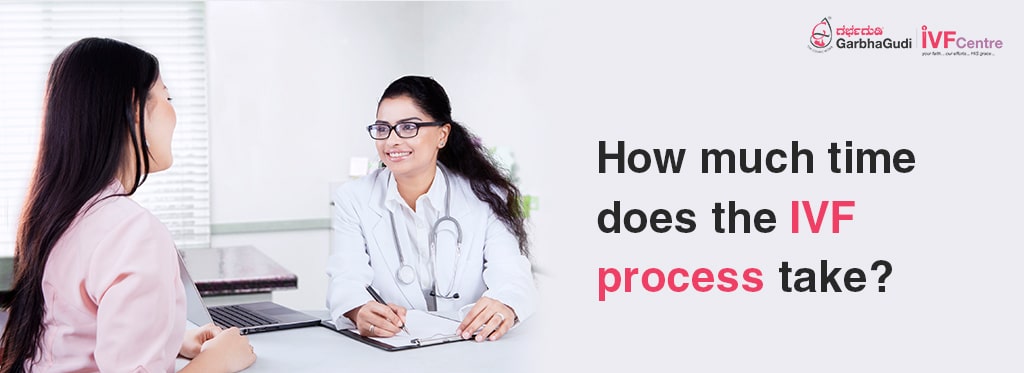How much time does the IVF process take?

The IVF cycle or process, from start to finish.
The decision to start a family is a big one. With such decisions come certain questions too. Especially, “How long does the IVF process take from start to finish?” We have the answers here.
A normal IVF cycle itself takes around four weeks, the length of a normal ovulation cycle. Treatment begins only after initial fertility testing which includes assessing your ovarian reserve or egg quality, uterine cavity evaluation and semen analysis. To make sure you are at your healthiest before conceiving, we recommend a medical evaluation and 90 days of preconception health and lifestyle modifications to make it easier for you to conceive.
Once diagnostic testing is complete, the IVF cycle begins.
Stage 1: Oral Contraceptives – Birth Control
IVF patients will start oral contraceptives for 10-14 days before starting fertility medications. When taken before ovarian stimulation, studies show that oral contraceptives can increase the number of eggs available for retrieval, ensure follicles grow adequately and support ovarian health throughout IVF.
Stage 2: Fertility Medication – Stimulation
We begin with fertility medication for approximately 9-11 days which consist of naturally occurring hormones that help develop and mature your follicles. During this time, you should plan to be in the centre approximately every other day for a vaginal ultrasound and blood monitoring.
Stage 3: Egg Retrieval
Egg retrieval is a one-day procedure where the eggs are extracted from the ovarian follicles and are left to fertilize for 5 days for embryo growth.
Stage 4: Embryo Transfer
After fertilization, the embryo will be transferred back to the uterus on day 5. The next step is to wait to see if the embryo implants in the uterus, which typically takes 9-10 days depending on the maturity of the embryo at the time of transfer.
Stage 5: Pregnancy test
A pregnancy blood test is performed about 9 days after the transfer to detect actual amounts of human chorionic gonadotropin (hCG), the hormone produced by the placenta after implantation.
Sometimes the body doesn’t respond as expected to IVF medications and stimulation, which can delay or cancel an IVF cycle. For example, there might be a delay or cancellation if a lower number of follicles develop in the ovaries than expected, meaning fewer eggs were produced. Sometimes hormone levels are not ideal for continuing an IVF cycle, and delaying can lead to better odds of success.